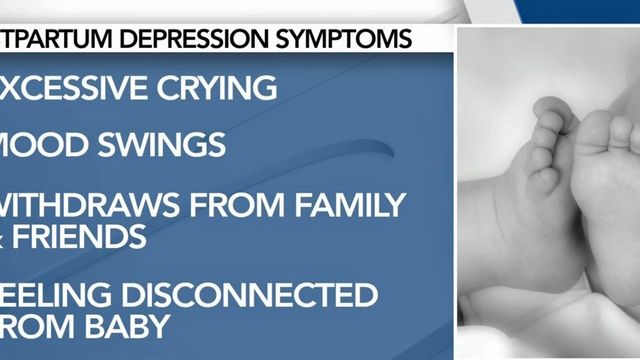Care for postpartum depression benefits moms, babies
Postpartum depression is a mood disorder that can affect women after childbirth, but a local organization wants to help women receive the care they need.
Posted — UpdatedPostpartum depression is a mood disorder that can affect women after childbirth, but a local organization wants to help women receive the care they need.
Lauran Ward's daughter, Piper, regularly sees pediatrician Dr. Christoph Diasio at Sandhill Pediatrics. Piper is a healthy and happy baby, but Ward has not always been a happy mom.
After her first child was born more than three years ago, she tried to ignore her unexplained sadness.
"It's all just part of being a new mom," Ward said. "The 'baby blues.' everybody calls it."
According to the National Institute of Mental Health postpartum depression afflicts up to 15 percent of new mothers. Symptoms can include excessive crying, mood swings, withdrawing from family and friends and feeling disconnected from the baby.
Diasio says it can easily affect the health of the baby.
"Makes perfect sense," Diasio said. "If the mother's unhappy, having postpartum depression—she's not going to interact with her baby the same way as an undepressed woman."
A year ago, Community Care of North Carolina began a statewide program called Pregnancy Medical Home to help more women receive screening and comprehensive postpartum care within 60 days of giving birth. The medical home concept involves several physicians, such as obstetricians and pediatricians, over the times of highest risk.
"Postpartum depression screening has several peaks: at six weeks, at two to three months, and again at six months," Diasio said. "So, there's a peak that the OB's are able to pick up, and then later, they're not really at the OB's office anymore, they're with their pediatrician."
Simple screening questions can reveal an issue that could lead to referral for appropriate care.
Ward says counseling and prescriptions have helped her enjoy motherhood more.
"I'm able to be the mother that both my kids deserve, my husband deserves—a wife who is happy and able to interact with my kids," Ward said.
Diasio says an increasing number of pediatricians are getting involved with this postpartum program, but one barrier is that not all private insurance companies cover the service.
However, North Carolina's Medicaid program does cover postpartum care.
• Credits
Copyright 2024 by Capitol Broadcasting Company. All rights reserved. This material may not be published, broadcast, rewritten or redistributed.





